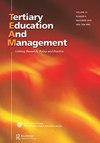学生对研究-教学关系的体验
IF 1.6
Q2 EDUCATION & EDUCATIONAL RESEARCH
引用次数: 0
摘要
根据学科的不同,学生在前三年的本科学习中体验到不同的研究与教学联系。问题是,同一学科的学生是否会根据他们学习的机构的不同,对这种联系有不同的体验。本研究探讨了一所研究型大学和一所教学型大学的学生在本科学习期间的研究-教学关系体验。一项调查(n = 340)分布在两所瑞典大学的商科学生中。其中一项发现是,两所大学的学生都报告了他们在体验这种联系和学习成果方面的进展。学生们对老师和他们自己所做的事情的评价也高于同龄人。两所大学的学生之间的主要差距是,来自研究密集型大学的学生普遍认为教学与研究之间的联系比来自教学密集型大学的学生更强。他们还在更高程度上发现,在他们的教育中,研究和教学之间的紧密联系对他们未来的工作生活很重要,而来自教学密集型大学的学生则更不确定。本文章由计算机程序翻译,如有差异,请以英文原文为准。
Students’ experiences of the research-teaching nexus
Abstract Students experience the research-teaching nexus differently as they progress through their first three years of undergraduate study depending on the discipline. The question is if students, within the same discipline, experience the nexus differently depending on the profile of the institution where they study. The present study explored students’ experiences of the research-teaching nexus (RT-nexus) during their undergraduate studies at one research-intensive and one teaching-intensive university. A survey ( n = 340) was distributed among business students at two Swedish universities. One finding is that students from both universities reported on a progression in how they experience the nexus, and in learning outcomes. Students also rated what teachers do and what they themselves do higher, than what their peers do. The main gap between students from the two universities was that students from the research-intensive university generally perceived a stronger connection between teaching and research than did students from the teaching-intensive university. They also to a higher extent found that a close connection between research and teaching in their education would be important to them in their future work life, whereas students from the teaching-intensive university were more unsure.
求助全文
通过发布文献求助,成功后即可免费获取论文全文。
去求助
来源期刊

Tertiary Education and Management
EDUCATION & EDUCATIONAL RESEARCH-
CiteScore
3.00
自引率
0.00%
发文量
15
期刊介绍:
Tertiary Education and Management (TEAM) is an international, interdisciplinary and peer-reviewed journal that welcomes research contributions that reflect upon, study or question main developmental trends and practices, and address current and future challenges in higher education. The thematic focus of TEAM includes management, governance and organisation of higher education; teaching and learning in higher education; the academic profession and academic careers; higher education and the labour market; and institutional research in higher education. TEAM is jointly published by Springer and EAIR – The European Higher Education Society, and is intended to contribute to EAIR’s mission of creating a better linkage of research, policy and practice in higher education.Articles submitted should as a consequence be written for, understood by, and be relevant for a multicultural, multifaceted and international audience, consisting of both the international academic community and the field of practice within higher education. TEAM welcomes articles using a variety of approaches, methods and perspectives given that the article demonstrate the relevance of the research in a broader context whether this be in other higher education institutions, other national settings or in the international arena. Occasionally, the journal also publishes articles where personal viewpoints/experiences or political arguments are made to stimulate discussion and reflection, or to challenge established thinking in the field of higher education. Such pieces are published in a dedicated ''Forum'' section of the journal.
 求助内容:
求助内容: 应助结果提醒方式:
应助结果提醒方式:


